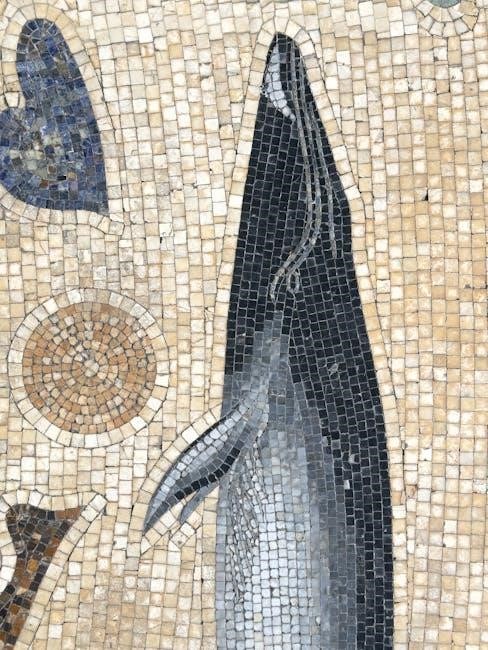Natalie Haynes’ work bridges ancient wisdom with modern challenges, offering timeless insights into philosophy, culture, and daily life, proving the past’s enduring relevance today․
Overview of the Concept
Natalie Haynes’ “The Ancient Guide to Modern Life” explores how ancient wisdom remains remarkably relevant in today’s world․ By examining philosophy, culture, and daily life in antiquity, Haynes reveals timeless lessons that continue to resonate․ The book bridges the gap between past and present, offering insights into how ancient ideas can guide modern challenges․ It highlights the enduring influence of classical thought on contemporary issues, making ancient wisdom accessible and practical for today’s audience․ This approach not only educates but also inspires a fresh perspective on living in the modern era․
Relevance of Ancient Wisdom in the Modern World
Ancient wisdom offers timeless insights into modern challenges, providing practical guidance for living meaningfully today․ Concepts like Stoicism and Epicureanism help navigate stress and moderation, while classical philosophers’ views on happiness and ethics remain surprisingly relevant․ The book demonstrates how ancient ideas, though rooted in a different era, continue to inspire solutions to contemporary issues, proving that the past is not just history but a valuable guide for shaping a better future․
Structure of the Guide
The guide is organized into thematic sections, each exploring how ancient wisdom applies to modern life․ It covers philosophy, social structures, relationships, health, work, and technology, drawing parallels between past and present․ Chapters are designed to be accessible, blending historical context with contemporary relevance․ The book also includes practical lessons from ancient governance, ethics, and personal growth, offering a holistic approach to understanding how ancient ideas can enhance modern living․ This structure ensures readers can easily navigate and apply timeless wisdom to their lives․

Ancient Philosophy and Modern Life
Ancient philosophies like Stoicism and Epicureanism offer timeless wisdom, providing practical solutions to modern stress, promoting balance, and encouraging mindful living in today’s fast-paced world․
Stoicism: Lessons for Modern Stress Management
Stoicism, an ancient philosophy, teaches the power of emotional resilience and rational thinking․ By focusing on what we can control and accepting what we cannot, it offers practical tools for managing modern stress․ Techniques like negative visualization and the dichotomy of control help individuals cultivate inner peace amidst chaos․ This timeless wisdom encourages mindfulness, gratitude, and a focus on meaningful goals, making it a valuable resource for navigating today’s fast-paced and unpredictable world․
Epicureanism: The Art of Moderate Living
Epicureanism emphasizes the pursuit of happiness through modest living, free from excessive desires and fears․ It advocates for a balanced life, valuing friendships, intellectual pursuits, and self-sufficiency․ By focusing on what truly brings fulfillment, individuals can cultivate inner peace and contentment․ This philosophy encourages moderation, not deprivation, offering a timeless approach to managing modern stress and finding joy in simplicity․ Its principles remain relevant, guiding people toward a life of purpose and harmony in today’s fast-paced world․
How Ancient Philosophers Viewed Happiness
Ancient philosophers like Aristotle and Epicurus explored happiness as a state of being rooted in virtue, reason, and moderation․ Aristotle’s concept of “eudaimonia” emphasized living a virtuous life, while Epicurus linked happiness to the absence of physical pain and mental distress․ These ideas stress that happiness is not fleeting pleasure but a long-term state achieved through ethical living, self-control, and intellectual pursuits․ Their insights remain relevant, offering a framework for understanding happiness in modern times․

Ancient Social Structures and Modern Society
Ancient societies emphasized family, community, and hierarchical systems, influencing modern social norms and structures, revealing timeless relevance in understanding human relationships and organizational frameworks today․
Family Dynamics in Ancient Times
In ancient societies, family structures were deeply hierarchical, with patriarchal figures holding significant authority․ Extended families often lived together, fostering strong communal bonds and shared responsibilities․ Women typically managed domestic duties, while children were expected to respect elders and contribute to household tasks․ These dynamics were integral to social cohesion and economic survival․ The concept of family honor and lineage was paramount, influencing legal and cultural practices․ While modern families have evolved, ancient principles of respect, duty, and interdependence continue to resonate, offering insights into the enduring importance of familial ties․
The Role of Community in Ancient Cultures
In ancient cultures, community was the bedrock of social life, fostering unity and cooperation through shared traditions and collective goals․ Festivals, rituals, and public spaces strengthened bonds, emphasizing the importance of harmony over individualism․ Philosophers like Aristotle highlighted the community’s role in shaping moral character and promoting the common good․ This ancient emphasis on interconnectedness offers timeless lessons for building resilient, compassionate societies today․
Lessons from Ancient Governance Systems
Ancient governance systems, such as those in Rome and Athens, provide valuable insights into leadership and administration․ The Roman Republic’s checks and balances, for example, influenced modern political structures․ Athenian democracy, despite its limitations, established foundational principles of civic participation․ These systems emphasized justice, fairness, and accountability, offering timeless lessons for contemporary governance․ By studying these ancient models, modern societies can refine their approaches to leadership and public policy, ensuring more equitable and effective governance․

Ancient Wisdom on Relationships
Ancient perspectives on love, friendship, and conflict resolution offer timeless insights into modern relationship dynamics, emphasizing empathy, mutual respect, and enduring human connections across centuries․
Love and Partnership in Ancient Perspectives
Ancient civilizations viewed love and partnership as profound emotional and intellectual bonds․ Greek philosophers like Aristotle emphasized deep affection and mutual respect, while Romans valued fidelity․ These perspectives highlight the importance of trust, communication, and shared values in relationships, offering timeless lessons for modern partnerships․ By exploring ancient ideas, we gain insights into nurturing enduring connections rooted in understanding and commitment, principles that remain as relevant today as they were centuries ago․
Friendship in the Ancient World
Ancient cultures highly valued friendship, viewing it as a cornerstone of personal and societal well-being․ Philosophers like Aristotle emphasized friendship as a virtue, highlighting its role in fostering trust, loyalty, and emotional support․ In ancient Rome, friendships were often celebrated for their depth and mutual respect․ These perspectives underscore the enduring importance of meaningful connections, reminding us that true friends, though rare, enrich our lives profoundly․ Ancient wisdom on friendship continues to inspire modern relationships, emphasizing the value of authenticity and lasting bonds․
Conflict Resolution Techniques from Antiquity
Ancient societies developed sophisticated methods to resolve conflicts, emphasizing dialogue, empathy, and fairness․ Philosophers like Aristotle and Cicero advocated for moderation and reason to ease disputes․ Mediation and negotiation were common practices, often involving community elders or leaders․ Restorative justice, focusing on repairing harm rather than punishment, was also employed․ These techniques highlight the importance of understanding and compromise, offering timeless lessons for resolving modern conflicts with grace and wisdom․

Ancient Approaches to Health and Well-being

Ancient civilizations emphasized holistic health, balancing diet, exercise, and mental well-being․ Practices like meditation, herbal remedies, and communal fitness rituals promoted longevity and vitality, inspiring modern wellness traditions․
Diet and Nutrition in Ancient Civilizations
Ancient diets varied widely, from the Mediterranean emphasis on fruits, vegetables, and olive oil to the grain-based meals of early agricultural societies․ Physicians like Hippocrates stressed the importance of diet in health, advocating for moderation and balance․ Many ancient cultures believed food had medicinal properties, using herbs and natural remedies to treat ailments․ These practices highlight a holistic approach to nutrition, contrasting with modern processed diets and offering timeless lessons in mindful eating and sustainability․
Physical Fitness in Ancient Times
Ancient civilizations highly valued physical fitness, integrating it into daily life and culture․ In ancient Greece, sports like wrestling and chariot racing were central to the Olympic Games, while Rome emphasized military training and public baths for exercise․ Public gyms and training facilities were common, fostering community and physical health․ These practices not only promoted strength and agility but also reflected societal values of discipline and wellness, offering lessons for modern approaches to exercise and holistic well-being;
Mental Health Practices from Ancient Cultures
Ancient cultures recognized the importance of mental well-being, often integrating spiritual and holistic practices․ In ancient Egypt, mental health was linked to spiritual balance, while Chinese traditions emphasized meditation and acupuncture․ These practices aimed to restore harmony between mind, body, and spirit, reflecting a deep understanding of emotional and psychological health․ Such timeless approaches continue to inspire modern therapies, highlighting the enduring relevance of ancient wisdom in addressing mental health challenges today․

Ancient Views on Work and Productivity
Ancient Greeks and Romans viewed work as a virtue, emphasizing balance and avoiding excess․ Leisure was valued for personal growth, reflecting a holistic approach to productivity․
The Concept of Work in Ancient Societies
In ancient societies, work was often viewed as a necessity tied to survival and societal roles․ Greeks and Romans valued labor as a virtue, with work seen as a means to contribute to the community․ Agricultural and artisanal work were central, while intellectual pursuits like philosophy and governance were reserved for the elite․ The concept of work was deeply intertwined with purpose and duty, often reflecting social hierarchies․ Ancient philosophers emphasized balance, warning against excessive toil, and advocating for time devoted to intellectual and creative pursuits․ This duality of purpose and moderation remains relevant today, offering insights into modern work-life dynamics․
Time Management in Ancient Cultures
Ancient cultures valued time as a precious resource, often organizing life around natural cycles and communal needs․ Philosophers like Seneca emphasized living intentionally, prioritizing meaningful activities over fleeting distractions․ The Greeks divided time into public and private spheres, balancing civic duties with personal pursuits․ Similarly, Romans structured their days with precision, blending work, rest, and leisure․ These principles highlight the enduring relevance of mindful time management, encouraging modern individuals to align their routines with purpose and balance, much like their ancient counterparts․
Balance Between Work and Leisure in Antiquity
Ancient cultures recognized the importance of balancing work and leisure, fostering a holistic approach to life․ The Greeks valued “skole,” or leisure, for intellectual pursuits, while Romans incorporated public entertainment and rest․ Philosophers like Seneca advocated for moderation, urging individuals to dedicate time to both productivity and personal enrichment․ This harmonious balance emphasized living purposefully, a principle that resonates with modern life, encouraging us to integrate work and leisure mindfully for overall well-being and fulfillment․

Ancient Guide to Modern Technology
Ancient inventions and innovations laid the groundwork for modern technology, offering timeless lessons on creativity, problem-solving, and ethical considerations in technological advancement․
How Ancient Inventions Paved the Way for Modern Tech
Ancient inventions like the Antikythera mechanism and early water mills laid the foundation for modern technology․ These innovations showcased humanity’s ingenuity, providing blueprints for future advancements․ From the wheel to the printing press, ancient creations revolutionized communication and industry, influencing contemporary tech․ They demonstrated principles of engineering, mathematics, and problem-solving, which remain essential today․ These advancements not only highlight human creativity but also reveal how ancient solutions continue to inspire and shape modern technological progress in unexpected ways, bridging the gap between past and present․
Lessons from Ancient Innovations
Ancient innovations, such as the Antikythera mechanism and Roman engineering feats, demonstrate remarkable ingenuity; These advancements highlight the importance of sustainability, efficiency, and creativity․ By studying these inventions, modern society can learn to adapt and refine ancient principles for contemporary challenges․ The ingenuity of our ancestors underscores the value of timeless problem-solving, offering insights into sustainable design and resource management․ These lessons remind us that innovation is often rooted in understanding and building upon the achievements of the past, making ancient wisdom a valuable resource for modern progress and development․
Ethical Considerations from Ancient Wisdom
Ancient wisdom offers profound insights into ethical living, emphasizing justice, fairness, and moral responsibility․ Philosophers like Aristotle and Confucius stressed the importance of virtues and harmony in society․ These teachings highlight the need for balance between individual ambitions and collective well-being․ By studying ancient moral codes, modern society can better navigate ethical dilemmas, fostering integrity and compassion․ The timeless principles of honesty, respect, and accountability remind us that ethical behavior is the foundation of a thriving and just world, connecting past wisdom to contemporary challenges․

Ancient Wisdom on Personal Growth
Ancient philosophers emphasized self-reflection, resilience, and cultivating virtues for personal growth, offering timeless principles to help individuals thrive in both ancient and modern times․
Self-Reflection Practices from Ancient Times
Ancient philosophers like Socrates and Marcus Aurelius emphasized self-reflection as a cornerstone of personal growth․ Practices such as journaling, meditative walks, and introspective dialogue were common․ These methods encouraged individuals to examine their thoughts, actions, and values, fostering self-awareness and moral clarity․ By engaging in regular self-reflection, ancient thinkers believed one could cultivate wisdom, virtue, and emotional resilience․ These timeless practices remain relevant today, offering a powerful tool for navigating life’s complexities with greater insight and purpose․
Goal Setting in Ancient Philosophies
Ancient philosophers emphasized the importance of setting meaningful goals aligned with virtue and self-improvement․ Stoicism taught focusing on internal goals, such as cultivating resilience, rather than external outcomes․ Aristotle’s concept of eudaimonia highlighted setting aspirations that promote a life of virtue and fulfillment․ These philosophies encouraged individuals to define clear objectives, prioritize ethical living, and strive for personal growth․ By grounding goals in timeless principles, ancient thinkers provided a framework for achieving purpose and direction, a wisdom that remains invaluable in modern life․
Resilience and Perseverance in Ancient Cultures
Ancient cultures deeply valued resilience and perseverance, viewing them as essential virtues for navigating life’s challenges․ Philosophers like the Stoics emphasized enduring hardship with equanimity, while Roman thinkers like Seneca advocated for turning adversity into opportunity․ These principles were reflected in practices such as rigorous training and communal support, fostering strength in the face of difficulty․ The timeless wisdom of these approaches inspires modern individuals to embrace resilience as a cornerstone of personal and collective well-being, proving their enduring relevance in contemporary life․

Ancient Guide to Modern Ethics
Ancient moral codes, such as justice and fairness, continue to shape modern ethical dilemmas, offering timeless wisdom on balancing individual and societal responsibilities with integrity․
Moral Codes from Ancient Civilizations
Ancient civilizations laid the groundwork for modern ethics through timeless moral codes․ From the Stoics to Confucius, these systems emphasized justice, fairness, and societal harmony․ Philosophers like Seneca and Cicero advocated for virtues such as honesty and compassion․ These principles, rooted in human nature, continue to influence contemporary ethical debates, offering guidance on issues like equality and environmental stewardship․ By studying these ancient moral frameworks, we gain insights into universal values that transcend time, enriching our approach to modern ethical dilemmas․ Their legacy remains a cornerstone of ethical reasoning today․
Justice and Fairness in Ancient Societies
Ancient societies developed intricate systems to uphold justice and fairness, shaping modern legal frameworks․ The Code of Hammurabi and the Twelve Tables of Rome established rules and penalties, emphasizing accountability․ Greek philosophers like Aristotle advocated for justice as a moral virtue․ These systems aimed to balance individual rights with societal harmony․ Their legacy influences contemporary notions of equality and legal impartiality, proving ancient principles remain foundational to modern justice systems and ethical governance․
Environmental Stewardship in Ancient Cultures
Ancient cultures often viewed nature with reverence, fostering sustainable practices that balanced human needs with environmental preservation․ Indigenous communities practiced permaculture and seasonal harvesting to maintain ecological harmony․ Philosophers like Aristotle emphasized the interconnectedness of life, advocating for responsible land use․ Sacred groves and conservation efforts were common, reflecting a deep spiritual connection to the earth․ These ancient practices offer timeless lessons for modern environmental challenges, highlighting the importance of living in sync with nature for future generations․
The ancient guide to modern life reveals timeless wisdom, offering insights into philosophy, culture, and daily living, proving the past’s enduring relevance in shaping our present and future․
Final Thoughts on the Timeless Relevance of Ancient Wisdom
Ancient wisdom continues to captivate modern audiences, offering insights into human nature, ethics, and life’s complexities․ Philosophers like Seneca and satirists like Juvenal remind us that human struggles and aspirations remain constant across centuries․ Their works, reinterpreted by scholars and writers such as Natalie Haynes, highlight the enduring relevance of ancient thought in addressing contemporary challenges; By bridging the past and present, these timeless lessons inspire personal growth, resilience, and a deeper understanding of our shared human experience, proving that ancient wisdom is as vital today as it was in antiquity․
Applying Ancient Lessons to Contemporary Challenges
Ancient wisdom offers practical solutions to modern dilemmas, from Stoic stress management to Epicurean moderation․ Philosophical insights guide ethical decision-making, while historical governance models inspire leadership․ These timeless lessons encourage resilience, balance, and mindful living, addressing contemporary issues like mental health and sustainability․ By aligning ancient principles with modern needs, individuals and societies can navigate complexity with clarity and purpose, fostering personal and collective growth․ Ancient wisdom remains a powerful tool for overcoming today’s challenges and building a harmonious future․
The Enduring Legacy of Ancient Guides
Ancient guides, such as Natalie Haynes’ work, reveal how past civilizations continue to influence modern thought and behavior․ Their teachings on ethics, governance, and personal well-being remain remarkably relevant․ By translating ancient ideas into contemporary contexts, these guides ensure that the wisdom of the past endures, providing a foundation for future generations to address new challenges with timeless insights and values․ The legacy of ancient guides lies in their ability to bridge eras, offering enduring wisdom for modern life․
